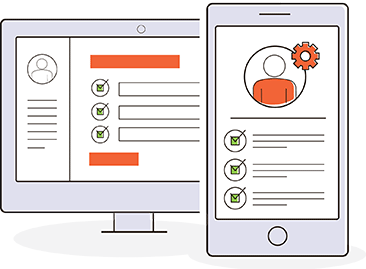BPM Software
BPM Software for Better Business Process Management

BPM software (or business process management software) provides a suite of tools to design, test, and implement automated business processes at a departmental or enterprise-wide scale.
What Does Integrify's BPM Software Include?
- A business process automation builder that is used to automate tasks in a process.
- An advanced, dynamic form designer with field logic and calculations.
- A scalable process engine that triggers and manages tasks efficiently.
- Reporting tools for monitoring and auditing all tasks and activities.
How Does BPM Software Help the Organization?
Ease of Use Across Skill Levels
With BPM software, business users or IT pros can rapidly build scalable, automated processes as part of a single departmental automation project or as part of a large-scale corporate initiative to implement process management across the enterprise. Integrify offers both the robust toolset and scalability to ensure these efforts are successful.
Deployment Flexibility
A BPM software platform can be cloud-based or installed on-premise depending on the compliance or security needs of the organization. The advantages of cloud-based software have made it a great option for scalability and low-maintenance but we provide flexible alternatives for hosting our software as needed, even within heavily-regulated industries.
Integration with Existing Systems
Integration has become more and more critical as a business requires a "conduit" between ERP, HRIS, CRM, Accounting and other data systems of record when starting or completing tasks or moving data as part of a process. We provide an open, REST-based API as well as a variety of task types that can access external systems.
Visit our free "BPM Guide" and learn more about how you can use BPM Tools and workflow management to improve productivity, ensure compliance and improve employee satisfaction.
Cross-Departmental Benefits
Integrify's BPM software helps organizations reduce costs, improve work output, and increase employee satisfaction by providing process definition, process automation, form and portal deployment and auditing for areas such as Information Technology, Finance, Sales, HR Marketing, and other types of internal functions.
Choosing the Right Solution
There are a lot of BPM vendors out there providing BPM and workflow automation solutions. It's hard to cut through all the features and messaging to figure out which solution is right for your organization's specific needs. Here are some considerations for making your selection.
How does it integrate and what does it integrate with?
BPM software vendors have different approaches to integration. Here are a few that you're likely to run across:
- It integrates exclusively with enterprise applications like Microsoft SharePoint or specific HRIS systems, which is good if you plan on sticking with those systems.
- It integrates with a handful of enterprise applications based on limited partner relationships with those vendors.
- It provides an open system with standalone Web services that allow process integration with almost any system. Some custom work may be required.
- It offers a broad variety of integrations through middleware, where the solution connects to a third-party service which then connects to a wide variety of applications.
Integration examples could include a variety of data or task-related activities:
- Creating/synchronizing users
- Launching processes from an external system
- Moving files and data between systems
- Pushing data to an external reporting tool
- Synching data tables
- Viewing the status of a process externally
Decide what's best for your organization and find a solution that integrates with what you have and what you may have in the future.
What is the length of a typical implementation?
Most software (SaaS or otherwise) purchasers expect to see a return on their investment fairly quickly, with the folks that approved the purchase likely expecting it even more quickly. Rapid implementation isn't always possible depending on the complexity of the solution, the number of people to train, the integrations that need to be set up, etc. However, if the vendor doesn't offer professional services, you're on your own to either figure it all out or hire an outside consultant to help you build and implement your workflows.
Vendors that offer professional services should be able to provide a good estimate of when the solution will be rolled out publicly (or at least to a pilot group) because, while every situation is unique, established vendors have seen pretty much everything and will have a frame of reference from which to draw. They may also have a variety of prototypes or proof of concept options that can be leveraged prior to signing a contract. These will give you both an idea of the vendor's capabilities and the likely timeline for rollout.
Remember that sometimes the biggest torpedo in the side of an implementation project will come from internal sources. Here are some tips for ensuring a successful project:
- Focus on the real issues. It can be tempting to investigate and try to include a lot of bells and whistles when evaluating vendors as well as when building out your workflow. Don't get sidetracked by too many "what if's" and shiny objects with your first project.
- Keep internal communications as open as possible with stakeholders and let them know the timeframe and what you expect of them.
- Document, document, document. Make sure that all the relevant processes are documented and validated with internal stakeholders before any building starts.
- Define your metrics. What do you expect a new, automated workflow to deliver in terms of performance improvement? This will help determine your KPIs and, subsequently, your reports and dashboard metrics.
Can non-IT business people use the system and build with it?
Thanks to the rise of the "Citizen Developer," some vendors have focused on making their tools easier to use when creating forms and processes. This means a lot of visual, drag-and-drop tools as well as pre-built templates that allow you to hit the ground running without having a degree from MIT.
You can get a sense of how easy a system is to use from watching a live or recorded demonstration but a better approach is to request a trial account with a pre-built process you can reference. This will give you a chance to share the actual working environment with anyone who may be using it. Put yourself in the mindset that you have already purchased the system and you need to get things done in it. How hard is it to use? How does the interface make you feel, considering you and others may spend a lot of time in it? Check out the Help site as well. Vendors who value user experience will leave you feeling secure and confident.
What Platforms Do You Support?
Cloud-based software has distinct advantages over premise-based software but it's not always A) your call and B) allowed by your industry. Some industries require software solutions to be completely under their control and within their firewalls (think financial, government, legal). In addition, some organizations need to integrate with on-premise systems (for instance Active Directory) that will only connect to other premise-based systems. These situations dictate a premise-based solution.
Outside of these scenarios, the cloud option offers a lot of benefits in terms of administration, cost, implementation time, etc. Another option is a private cloud implementation, which offers some benefits of the first two platforms but also some of the downsides. Consider vendors who offer all the options, but if you've already discussed solutions with IT (or you are IT) you probably have a good idea which one you'll need.
You Say It's Flexible. HOW Flexible?
Most workflow management vendors will say they're flexible, customizable, configurable, etc. but get a demo and ask to see how workflows are actually built within the system. Ask questions about alternate methods/options for performing certain workflow tasks and if custom programming is possible. For instance, using javascript in a form to add additional functionality. If the system is a "walled garden" you're stuck with what the vendor thinks you need.
Some workflow management companies provide pre-built workflows as part of a "service catalog." While these solutions sound logical on the surface, the reality is that pre-built workflows are usually more trouble than they’re worth. Most organizations have very specific, custom ways of handling requests and pre-built workflows invariably need to be customized to fit those methods. Often it's faster to simply build from scratch than to modify automated workflows that have been designed for wide adoption.
Quick Reference: Choosing a BPM Software Vendor
Factor |
Consideration |
|
Integration |
Is there a need to integrate with a single system, multiple systems, or a homegrown solution? |
|
Implementation |
How long does a typical implementation take, and will it be led by the vendor or an internal team? |
|
Ease of Use |
Can business users administer and update the system, or is development/IT needed? |
|
Platforms |
Is the system available in the cloud, on-premise, or self-managed? |
|
Flexibility |
How flexible is the solution for customization, for instance, using additional code, changing the configuration, or getting “under the hood?” |
|
Pricing/Licensing |
Is the pricing based on users, processes, transactions, fixed, or concurrency? |
|
Scope |
Is this a solution for one department, multiple departments, or organization-wide? |
|
Task Management |
Does the system provide robust tools for users when viewing and managing tasks or tracking progress? |
|
File/Document Handling |
Can the system include files and documents as part of the process and store them securely? |
|
Number of Processes |
Will there be a few complex processes, many simple processes, or a combination of these? |
|
Number if Subprocesses |
Will processes require multiple subprocesses (“Child Processes”) to meet requirements? |
|
Use of Business Rules |
Will the processes and any associated forms require simple or complex business rules? |
Interested in Our BPM Software Solution?
We have a variety of resources to help you on your journey to an automated workflow.
- Workflow Tools and eBooks
- Workflow Ideas Weekly eMail Newsletter
- Recorded Demonstration of our Workflow Automation Software
- Request a Live Demonstration
Contact us to discuss your needs and get a customized demonstration of our software. We're also happy to provide a trial of Integrify. You'll discover why Integrify is considered the best BPM software available for mid-sized and enterprise businesses.

